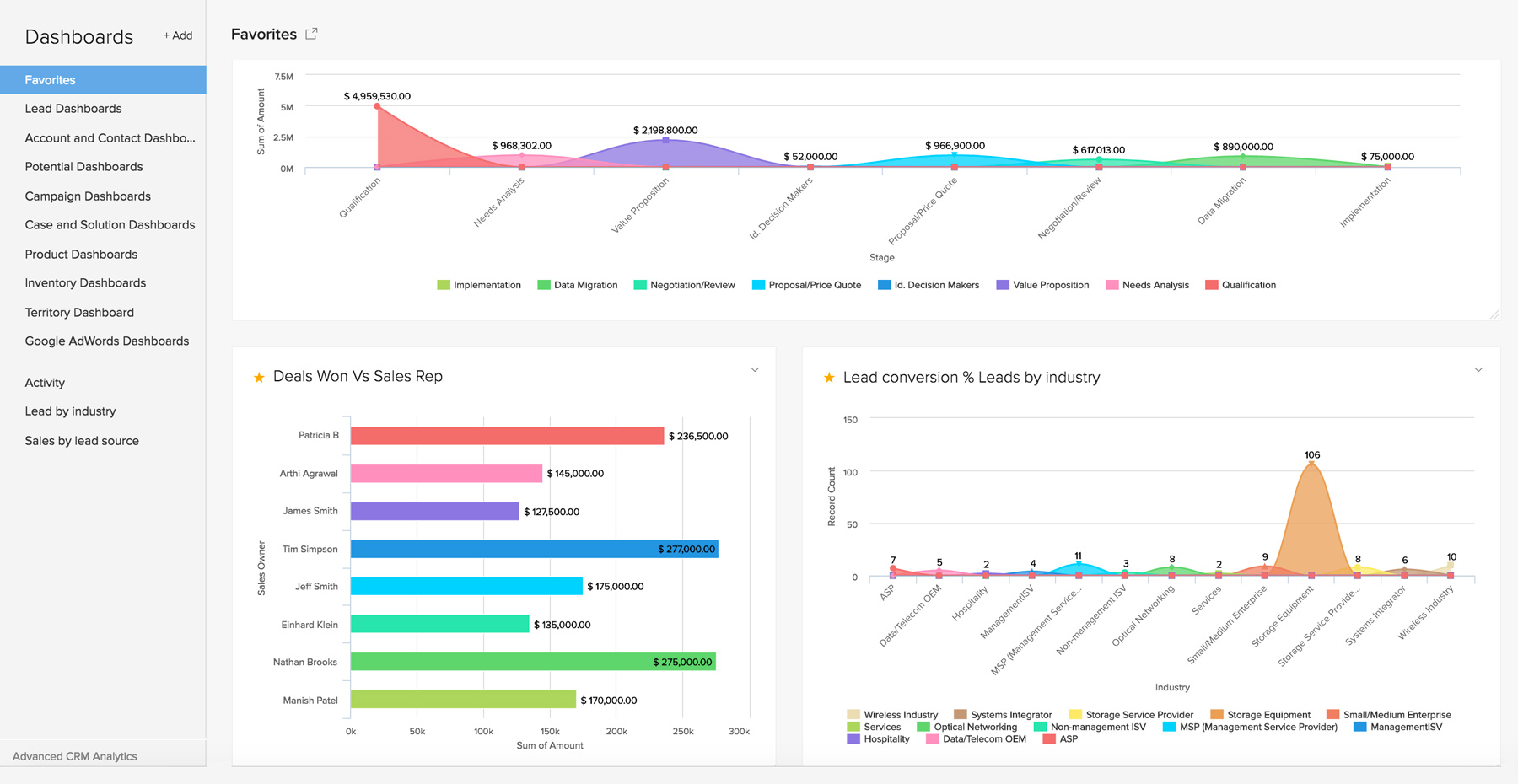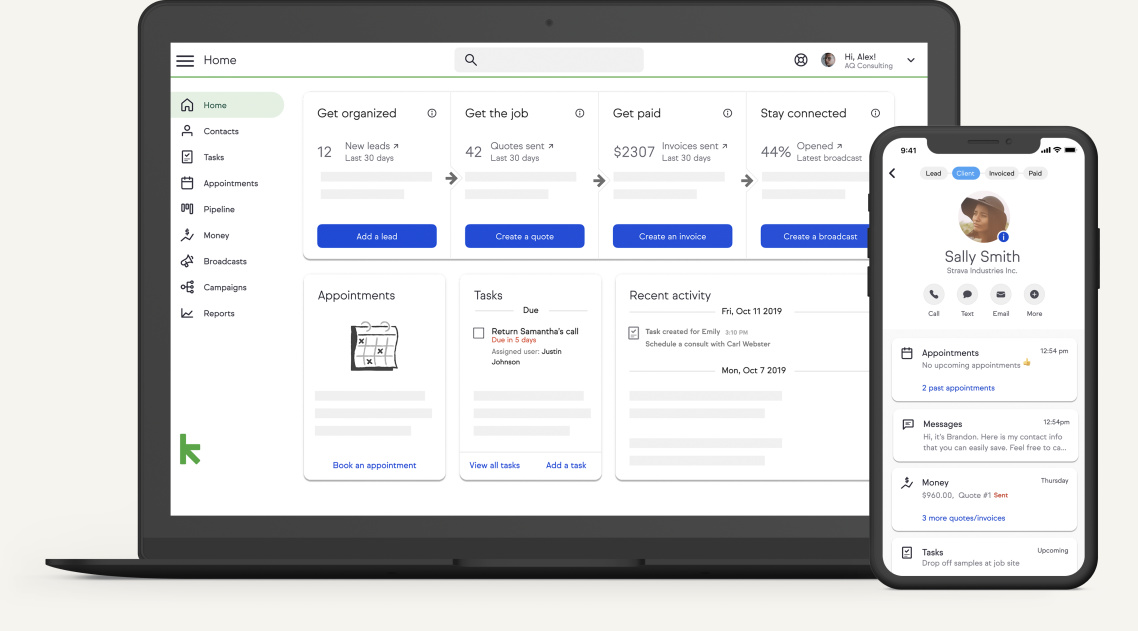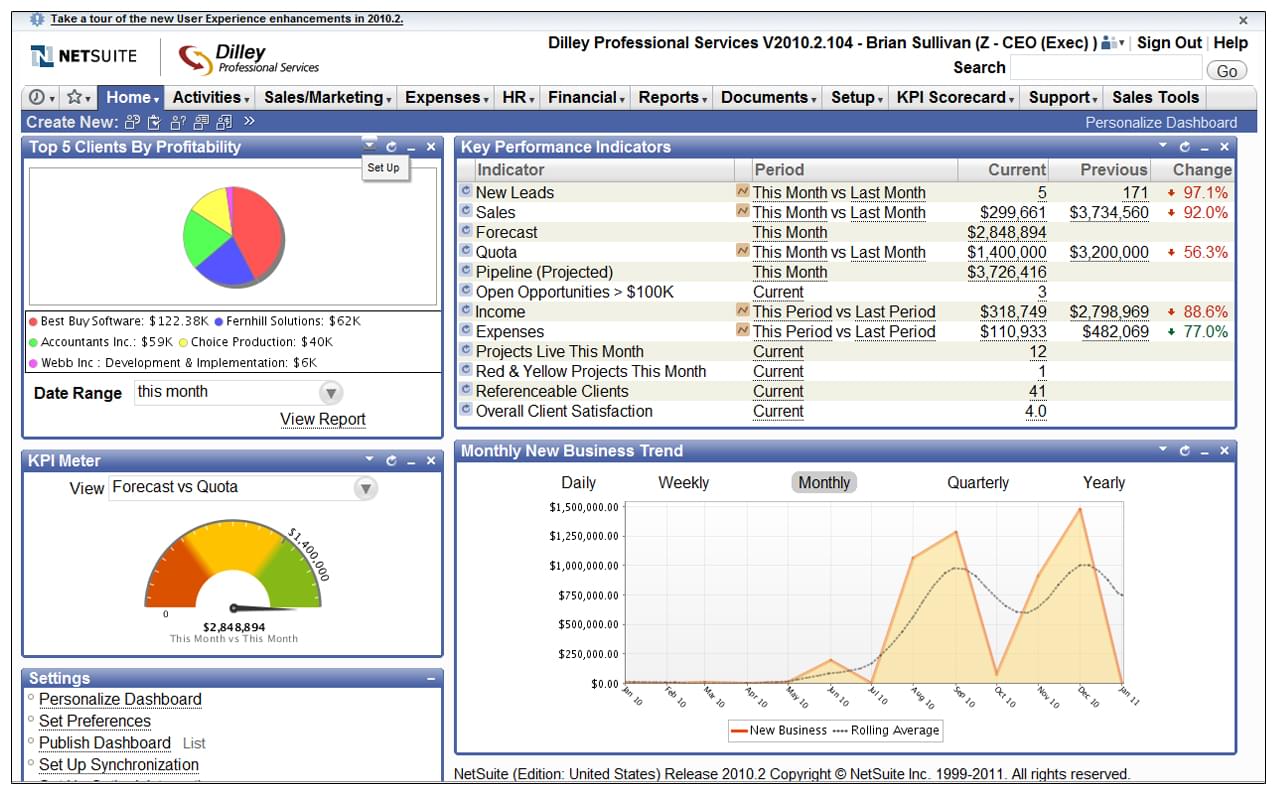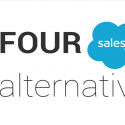Salesforce Alternatives
It’s nearly undeniable that Salesforce is the industry leader in customer relationship management. The publicly traded company has over 150,000 customers, and changed the face of the CRM industry when it launched its cloud-based product.
But that doesn’t mean it’s automatically your best option. In fact, Salesforce (and the app ecosystem that its platform has spawned) can be a bit overwhelming for businesses seeking simple functionality at an affordable price.
It’s important to compare Salesforce with other “best of breed” solutions, and with vendors that perhaps get less media attention, but still have a solid product. There are a number of Salesforce alternatives that function just as well, if not better for their own niche.
In the article below, we highlight some of the leading examples. To receive a personalized set of CRM recommendations for your business context, click the banner below to get started.
Zoho

Average user rating: 3.7/5
Zoho provides an integrated suite of cloud-based business apps for growing businesses, all of which can be purchased separately. That means their CRM application is fully compatible with a range of tools, such as business intelligence, marketing automation, and project management, making it a formidable alternative to Salesforce’s solution.
Zoho’s CRM solution is designed to help customer-facing organizations attract and retain current customers by selling smarter, automating repetitive tasks, and gaining full visibility into the sales cycle. The system is accessible on desktop computers via a web application or away from the office through native mobile apps for Android and iOS. Though Zoho has fewer add-ons than Salesforce, users can still build out their system through an online marketplace. If you work on a small team, you might even be able to use Zoho for free (up to 10 users).
Unique Features:
- Visitor tracking
- Web forms
- Territory management
- Social Media CRM
- PhoneBridge
- Live customer chat
- Add-on marketplace
Keap

Average User Rating: 3.7/5
Keap offers cloud-based sales and marketing software targeted toward small teams. Their product combines CRM, marketing automation, and e-commerce to provide an end-to-end solution for customer-facing organizations. Starting in the second pricing tier, buyers gain access to all of these modules for a single monthly price, which makes Keap a strong alternative to Salesforce, whose marketing automation platform is a separate (and quite expensive) system.
Although pricier than Zoho, Keap is still a good option to consider. It can save a small team a considerable amount when adopted in place of Salesforce and other mega-vendor solutions. The system’s e-commerce features are also more sophisticated than most off-the-shelf CRMs. Keap can help you set up a complete online storefront and manage shopping carts, inventory, fulfillment, and billing.
Unique Features:
- Built-in marketing automation
- E-commerce
- Referral programs
- Add-on marketplace
- Visitor tracking
- Social marketing (with GroSocial add-on)
- Quotes and proposals
Netsuite

Average User Rating: 3.1/5
Serving nearly 16,000 clients, Oracle NetSuite is one of the world’s largest providers of cloud-based business software. Their CRM solution gives businesses a “real-time, 360-degree” view of each customer and facilitates the journey from lead, to opportunity, to sale. There are also additional provisions for order fulfillment, upsell and cross-sell, contract renewal, and customer support along the way.
Netsuite is anything but a niche product; their CRM+ platform addresses the whole spectrum of customer management needs, including CRM, sales and marketing automation. There’s even partner relationship management for companies that sell or market through partner channels. Many businesses have switched to Netsuite to replace unwieldy systems from larger vendors. Their CRM customers come from many different industries, including IT, retail, real estate, nonprofit, financial services, and more.
Unique Features:
- Partner relationship management
- Advanced sales forecasting
- Incentive compensation management
- Built-in marketing automation
- Case management
- Customer self-service
- Social CRM (with Yammer or Qontext add-on)
- Global sales and service management (multi-currency, multi-lingual)
SugarCRM
Average User Rating: 3.3/5
SugarCRM‘s vision is to “deliver a fully transformed, personalized user experience that is immersive, engaging, and intuitive.” To that end, their CRM platform is built with simplicity, mobility, and customization in mind — perhaps more reminiscent of a consumer app than a complicated business system. That said, SugarCRM can be deployed in a cloud or on-premise version, which gives buyers a little more flexibility in terms of infrastructure (after all, not every business wants a cloud CRM).
With over 30 supported languages and currencies and hundreds of preconfigured add-ons, the Sugar platform can expand to meet just about any business need, while keeping relationship management at the heart of it all. Sugar is available in three editions with pricing based on features and support.
Unique Features:
- Call center automation
- Optional cloud or on-premise deployment
- Customer self-service
- Trouble ticket management
- Activity streams
- “What-if” sales forecasting
Microsoft Dynamics CRM

Average User Rating: 3.2/5
Last, but certainly not least, is Microsoft Dynamics CRM — one of largest Salesforce competitors (see our side-by-side comparison of the two). The obvious reason for this rivalry is the striking similarity between the two systems, both in price and user experience. Microsoft’s flagship CRM product is Dynamics CRM Online Professional, which provides integrated sales and service functionality in either a cloud, on-premise, or hybrid platform.
Dynamics — like Salesforce — has an expansive add-on marketplace and partner developer network. Unsurprisingly, they provide the best integrations with other Microsoft products such as Outlook, Office 365, SharePoint, and SQL Server. Marketing automation features require purchase of an additional module though, or upgrading to an all-in-one suite, which could be a drawback for smaller teams. For this reason, Microsoft Dynamics is usually adopted by large or rapidly growing companies.
Unique Features:
- Case management
- Customer self-service
- Social CRM
- Enterprise social networking (through Yammer)
- Territory management
- Add-on marketplace
- Conferencing/IM
- Hybrid deployment options
Conclusion
Finding the right CRM for your company is never an easy task, but finding an alternatives to Salesforce isn’t as daunting as it might sound. Still unsure of which CRM is best? Use our CRM Product Selection Tool to find your perfect software match or contact our Tech Advisors for a free business technology consultation.
Top CRM Software Recommendations

